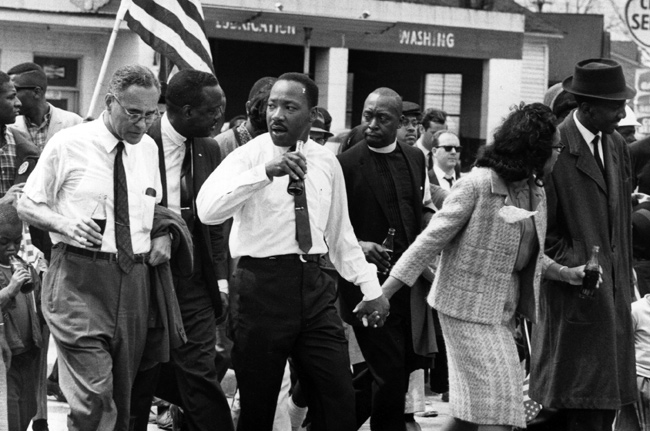
I found a lot to praise in Ava Duvernay’s Selma, which deconstructs the biopic genre just enough to keep it relevant. Even aside from her artistic choices, it takes as its subject one of the least discussed and most relevant King crusades, the voting rights march from Selma to Montgomery in 1965. The speech David Oyelowo gives at the end is legitimately stirring, no small feat in a film that you already know is going to end in a stirring speech.
As good as the version in the film is, it’s not the actual speech. The reason for this, incredibly, is that the MLK estate had already licensed the rights to those speeches to another studio, as Politico explains in a thorough breakdown:
The film’s numerous scenes of King delivering powerful speeches regarding civil rights all had to be paraphrased, because the MLK estate has already licensed the film rights in those speeches to DreamWorks and Warner Bros., for an MLK biopic Steven Spielberg is slated to produce.
And I swear I didn’t know this until after I had already referenced Spielberg in the headline of my review. Nonetheless, the full audio and transcript of the speech are online, and I thought Martin Luther King Day was as good an excuse as any to revisit it. Here’s a chunk:
Once more the method of nonviolent resistance was unsheathed from its scabbard, and once again an entire community was mobilized to confront the adversary. And again the brutality of a dying order shrieks across the land. […]
Our whole campaign in Alabama has been centered around the right to vote. In focusing the attention of the nation and the world today on the flagrant denial of the right to vote, we are exposing the very origin, the root cause, of racial segregation in the Southland. Racial segregation as a way of life did not come about as a natural result of hatred between the races immediately after the Civil War. There were no laws segregating the races then. And as the noted historian, C. Vann Woodward, in his book, The Strange Career of Jim Crow, clearly points out, the segregation of the races was really a political stratagem employed by the emerging Bourbon interests in the South to keep the southern masses divided and southern labor the cheapest in the land. You see, it was a simple thing to keep the poor white masses working for near-starvation wages in the years that followed the Civil War. Why, if the poor white plantation or mill worker became dissatisfied with his low wages, the plantation or mill owner would merely threaten to fire him and hire former Negro slaves and pay him even less. Thus, the southern wage level was kept almost unbearably low.
Toward the end of the Reconstruction era, something very significant happened. That is what was known as the Populist Movement. The leaders of this movement began awakening the poor white masses and the former Negro slaves to the fact that they were being fleeced by the emerging Bourbon interests. Not only that, but they began uniting the Negro and white masses into a voting bloc that threatened to drive the Bourbon interests from the command posts of political power in the South.
To meet this threat, the southern aristocracy began immediately to engineer this development of a segregated society. I want you to follow me through here because this is very important to see the roots of racism and the denial of the right to vote. Through their control of mass media, they revised the doctrine of white supremacy. They saturated the thinking of the poor white masses with it, thus clouding their minds to the real issue involved in the Populist Movement. They then directed the placement on the books of the South of laws that made it a crime for Negroes and whites to come together as equals at any level. And that did it. That crippled and eventually destroyed the Populist Movement of the nineteenth century.
If it may be said of the slavery era that the white man took the world and gave the Negro Jesus, then it may be said of the Reconstruction era that the southern aristocracy took the world and gave the poor white man Jim Crow. He gave him Jim Crow. And when his wrinkled stomach cried out for the food that his empty pockets could not provide, he ate Jim Crow, a psychological bird that told him that no matter how bad off he was, at least he was a white man, better than the black man. And he ate Jim Crow. And when his undernourished children cried out for the necessities that his low wages could not provide, he showed them the Jim Crow signs on the buses and in the stores, on the streets and in the public buildings. And his children, too, learned to feed upon Jim Crow, their last outpost of psychological oblivion.
There’s a lot more to the full speech, but this seems to be the crux of it. It’s still applicable and insightful in so many ways, and well, I like it quite a lot.
The other impressive thing about for me is that he did 30 straight minutes and he didn’t even pad it with crowd work. A lesser man would’ve gotten flustered and started asking the people in front what they do for a living and how long the couples have been together. “They ate Jim Crow. Also, hey, how about a round of applause for the wait staff. Aren’t they great?”
MLK didn’t even need crowd work. He was a great man.
[protected-iframe id=”2226c09124fd51885b72e6f87ae1cbf5-60970621-60061059″ info=”//player.vimeo.com/video/34763862″ width=”650″ height=”360″ frameborder=”0″ webkitallowfullscreen=”” mozallowfullscreen=”” allowfullscreen=””]
